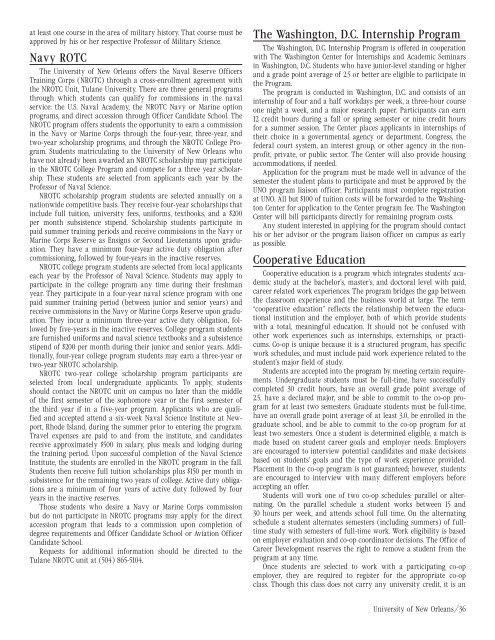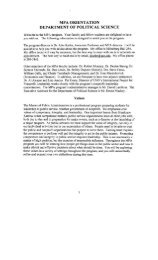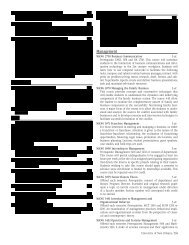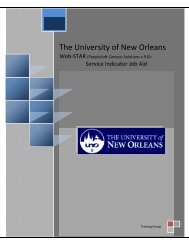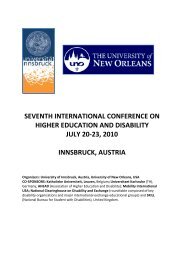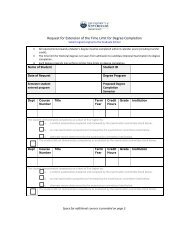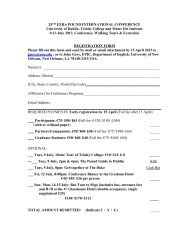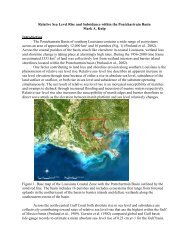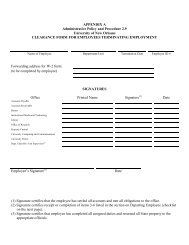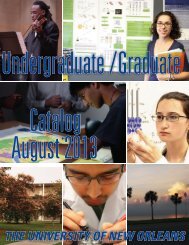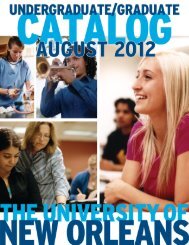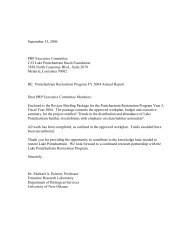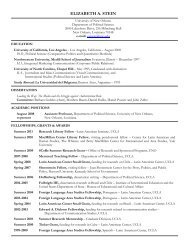Untitled - University of New Orleans
Untitled - University of New Orleans
Untitled - University of New Orleans
Create successful ePaper yourself
Turn your PDF publications into a flip-book with our unique Google optimized e-Paper software.
at least one course in the area <strong>of</strong> military history. That course must be<br />
approved by his or her respective Pr<strong>of</strong>essor <strong>of</strong> Military Science.<br />
Navy ROTC<br />
The <strong>University</strong> <strong>of</strong> <strong>New</strong> <strong>Orleans</strong> <strong>of</strong>fers the Naval Reserve Officers<br />
Training Corps (NROTC) through a cross-enrollment agreement with<br />
the NROTC Unit, Tulane <strong>University</strong>. There are three general programs<br />
through which students can qualify for commissions in the naval<br />
service: the U.S. Naval Academy, the NROTC Navy or Marine option<br />
programs, and direct accession through Officer Candidate School. The<br />
NROTC program <strong>of</strong>fers students the opportunity to earn a commission<br />
in the Navy or Marine Corps through the four-year, three-year, and<br />
two-year scholarship programs, and through the NROTC College Program.<br />
Students matriculating to the <strong>University</strong> <strong>of</strong> <strong>New</strong> <strong>Orleans</strong> who<br />
have not already been awarded an NROTC scholarship may participate<br />
in the NROTC College Program and compete for a three year scholarship.<br />
These students are selected from applicants each year by the<br />
Pr<strong>of</strong>essor <strong>of</strong> Naval Science.<br />
NROTC scholarship program students are selected annually on a<br />
nationwide competitive basis. They receive four-year scholarships that<br />
include full tuition, university fees, uniforms, textbooks, and a $200<br />
per month subsistence stipend. Scholarship students participate in<br />
paid summer training periods and receive commissions in the Navy or<br />
Marine Corps Reserve as Ensigns or Second Lieutenants upon graduation.<br />
They have a minimum four-year active duty obligation after<br />
commissioning, followed by four-years in the inactive reserves.<br />
NROTC college program students are selected from local applicants<br />
each year by the Pr<strong>of</strong>essor <strong>of</strong> Naval Science. Students may apply to<br />
participate in the college program any time during their freshman<br />
year. They participate in a four-year naval science program with one<br />
paid summer training period (between junior and senior years) and<br />
receive commissions in the Navy or Marine Corps Reserve upon graduation.<br />
They incur a minimum three-year active duty obligation, followed<br />
by five-years in the inactive reserves. College program students<br />
are furnished uniforms and naval science textbooks and a subsistence<br />
stipend <strong>of</strong> $200 per month during their junior and senior years. Additionally,<br />
four-year college program students may earn a three-year or<br />
two-year NROTC scholarship.<br />
NROTC two-year college scholarship program participants are<br />
selected from local undergraduate applicants. To apply, students<br />
should contact the NROTC unit on campus no later than the middle<br />
<strong>of</strong> the first semester <strong>of</strong> the sophomore year or the first semester <strong>of</strong><br />
the third year if in a five-year program. Applicants who are qualified<br />
and accepted attend a six-week Naval Science Institute at <strong>New</strong>port,<br />
Rhode Island, during the summer prior to entering the program.<br />
Travel expenses are paid to and from the institute, and candidates<br />
receive approximately $500 in salary, plus meals and lodging during<br />
the training period. Upon successful completion <strong>of</strong> the Naval Science<br />
Institute, the students are enrolled in the NROTC program in the fall.<br />
Students then receive full tuition scholarships plus $150 per month in<br />
subsistence for the remaining two years <strong>of</strong> college. Active duty obligations<br />
are a minimum <strong>of</strong> four years <strong>of</strong> active duty followed by four<br />
years in the inactive reserves.<br />
Those students who desire a Navy or Marine Corps commission<br />
but do not participate in NROTC programs may apply for the direct<br />
accession program that leads to a commission upon completion <strong>of</strong><br />
degree requirements and Officer Candidate School or Aviation Officer<br />
Candidate School.<br />
Requests for additional information should be directed to the<br />
Tulane NROTC unit at (504) 865-5104.<br />
The Washington, D.C. Internship Program<br />
The Washington, D.C. Internship Program is <strong>of</strong>fered in cooperation<br />
with The Washington Center for Internships and Academic Seminars<br />
in Washington, D.C. Students who have junior-level standing or higher<br />
and a grade point average <strong>of</strong> 2.5 or better are eligible to participate in<br />
the Program.<br />
The program is conducted in Washington, D.C. and consists <strong>of</strong> an<br />
internship <strong>of</strong> four and a half workdays per week, a three-hour course<br />
one night a week, and a major research paper. Participants can earn<br />
12 credit hours during a fall or spring semester or nine credit hours<br />
for a summer session. The Center places applicants in internships <strong>of</strong><br />
their choice in a governmental agency or department, Congress, the<br />
federal court system, an interest group, or other agency in the nonpr<strong>of</strong>it,<br />
private, or public sector. The Center will also provide housing<br />
accommodations, if needed.<br />
Application for the program must be made well in advance <strong>of</strong> the<br />
semester the student plans to participate and must be approved by the<br />
UNO program liaison <strong>of</strong>ficer. Participants must complete registration<br />
at UNO. All but $100 <strong>of</strong> tuition costs will be forwarded to the Washington<br />
Center for application to the Center program fee. The Washington<br />
Center will bill participants directly for remaining program costs.<br />
Any student interested in applying for the program should contact<br />
his or her advisor or the program liaison <strong>of</strong>ficer on campus as early<br />
as possible.<br />
Cooperative Education<br />
Cooperative education is a program which integrates students’ academic<br />
study at the bachelor’s, master’s, and doctoral level with paid,<br />
career related work experiences. The program bridges the gap between<br />
the classroom experience and the business world at large. The term<br />
“cooperative education” reflects the relationship between the educational<br />
institution and the employer, both <strong>of</strong> which provide students<br />
with a total, meaningful education. It should not be confused with<br />
other work experiences such as internships, externships, or practicums.<br />
Co-op is unique because it is a structured program, has specific<br />
work schedules, and must include paid work experience related to the<br />
student’s major field <strong>of</strong> study.<br />
Students are accepted into the program by meeting certain requirements.<br />
Undergraduate students must be full-time, have successfully<br />
completed 30 credit hours, have an overall grade point average <strong>of</strong><br />
2.5, have a declared major, and be able to commit to the co-op program<br />
for at least two semesters. Graduate students must be full-time,<br />
have an overall grade point average <strong>of</strong> at least 3.0, be enrolled in the<br />
graduate school, and be able to commit to the co-op program for at<br />
least two semesters. Once a student is determined eligible, a match is<br />
made based on student career goals and employer needs. Employers<br />
are encouraged to interview potential candidates and make decisions<br />
based on students’ goals and the type <strong>of</strong> work experience provided.<br />
Placement in the co-op program is not guaranteed; however, students<br />
are encouraged to interview with many different employers before<br />
accepting an <strong>of</strong>fer.<br />
Students will work one <strong>of</strong> two co-op schedules: parallel or alternating.<br />
On the parallel schedule a student works between 15 and<br />
30 hours per week, and attends school full time. On the alternating<br />
schedule a student alternates semesters (including summers) <strong>of</strong> fulltime<br />
study with semesters <strong>of</strong> full-time work. Work eligibility is based<br />
on employer evaluation and co-op coordinator decisions. The Office <strong>of</strong><br />
Career Development reserves the right to remove a student from the<br />
program at any time.<br />
Once students are selected to work with a participating co-op<br />
employer, they are required to register for the appropriate co-op<br />
class. Though this class does not carry any university credit, it is an<br />
<strong>University</strong> <strong>of</strong> <strong>New</strong> <strong>Orleans</strong>/36


